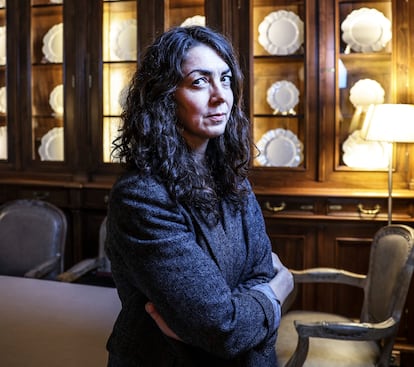Ana Carrasco Conde, philosopher: ‘Nothing more absurd than fleeing from death, it always accompanies you’
Known for her work on evil, the thinker just received the Eugenio Trías Essay Award. Her new book reflects on the final hours of life

Ana Carrasco Conde is known as “the philosopher of evil.” But she is attracted to the ineffable, the unspeakable, to putting into words that which cannot be said. She has always been fascinated by the shadow regions, the depths of the sea. From a very young age, she was attracted to German idealism (Schelling, Kant), an interest that led her to investigate the abysses of existence and publish three books about evil in nine years: Infierno horizontal. Sobre la destrucción del yo [Horizontal Hell: On the Destruction of the Self]; La limpidez del mal. El mal y la historia en la filosofía de F. W. J. Schelling [The Clarity of Evil: Evil and History in the Philosophy of F. W. J. Schelling, and Decir el mal. Understanding Comprender no es justificar [Speaking Evil. Understanding Is Not Justifying]. A professor of philosophy at the Complutense University of Madrid, this reflective 44-year-old woman speaks softly in a low voice, resistant to the contemporary rush that prevents her from taking the time to think things through. In November she received the Eugenio Trias Essay Prize for a book that represents a sea change in her career, La muerte en común [Death in Common]. In it, she examines the intersubjective dimension of dying and argues for thinking about death from a collective point of view.
The interview takes place on a cold December afternoon at the Urso Hotel in Madrid. Carrasco Conde begins by saying that death is not evil, that it is integral to being human. She points out that the great texts on death by the tradition’s great philosophers (and some of her colleagues) are an “impenetrable wall” for readers.
QUESTION. What is the problem with those texts? That they are written only for academic circles?
ANSWER. They say things in ways that do not take into account the dimension of the damage and pain of death. Philosophy today has lost one of its fundamental components, its most precious flower, Cicero says, which is the consolatory element. If it goes toward consolation, it gets confused with self-help, and I think philosophy has let self-help have a role when it could try to help itself.
Q. Could philosophy somehow replace self-help?
A. It’s not about substituting, and it has nothing to do with self-help. Initially, philosophy was an approach to understanding reality. It taught you not to accept reality as it comes, not to have positive thinking. It is about understanding, even if it hurts.
Q. In your new book you reflect on death. Do we have to learn to face it?
A. We have to learn to live and to die. Once we accept that we are going to die, we have to make a commitment to leading a life worth living. That does not mean applying that terrible interpretation that people have of carpe diem: since we are going to die, we are going to live everything intensely, like crazy. Horace does not say that. He says that you have to learn to live every moment intensely; not thinking about what you have to do; not always being outside yourself or always having your cell phone on you, which is a great way of not being present. You have to be present in life and enjoy the things that are happening now.
Always having your cell phone on you is a way of not being present.”
Q. Always having your cell phone on you is not being present?
A. You’re not with the person you’re with, you’re not here. It’s going to sound like I’m a technophobe, but I think it’s different to enjoy a concert looking at the musicians than to be with your cell phone in the way. We have this obsession with recording everything. Wouldn’t it be better to have everything etched into your memory? Ultimately, I think that what counts is accepting that you are going to die and accepting that it hurts, of course, but that this kind of certainty does not lead you to an unbridled life or a life of fleeing: [there’s] nothing more absurd than running away from death when it is always with you.
Q. It seems that people escape from loneliness through their cell phones. What are the implications for our society if we don’t know how to deal with loneliness?
A. This is nothing new. We are social beings, not because we live in society, but because we are configured in the collective, we carry the community within, always. But today we have reduced personal contact — community — to a minimum, because we are increasingly atomized. Where there used to be people in flesh and blood who could listen to you (or not), who taught you how to dialogue, there are now social networks. Then, [you have] subjectivity built around false images of people who only encourage your fears or your dogmatism.
Q. Don’t social networks replace the community?
A. I don’t think so. What they do is usurp that function. We are people who are always seeking relationships with others, but what we get through social networks often does not satisfy [that need]. Being in a room with a real person forces you to learn when to be quiet and when to speak. You have no filter on social networks; you can say anything and it doesn’t matter.
Q. Today, there are two major wars in the spotlight. Two of your themes, death and evil, converge in them. Does history show us that human beings are incapable of not doing evil?
A. We use clichés from many centuries ago. That the world is in the grip of evil is a complaint as old as time. We are violent and aggressive beings who are always in conflict: then, let’s shut it down and go, shall we? There is a shame about the species, a very negative conception of the human being. These inertias are in the way we all think, but what is philosophy all about?: it is about going astray, going off the road. And maybe we have to put aside these clichés. It is not evil; it is not war that repeats itself. It is our attitude of victimization toward them, because it is easier to say that we are evil beings than to try to think of measures to alleviate that which is not irremediable.
As Cicero said, philosophy has lost the most precious flower: the consolatory element.”
Q. What is your position on what is happening in Gaza?
A. Just because Hamas terrorists are Palestinians doesn’t mean that all Palestinians are Hamas terrorists. And it is one thing to pursue terrorism and another to unnecessarily murder people who have nothing to do with it. I also think that this demonization of Jews is harmful, because there are Jews who are not in favor of what is being done.
Q. You said in an interview, “In the face of hope, which leads to despair, despair leads us to be active.” Is hope bad?
A. I think that with hope we trust outside elements to solve our problems. When facing them, you have trust: do something with the good things you already have, don’t wait for them to come and save you. Distrust in human beings, for example, in the face of climate change, seems terrible to me because what are we going to solve, then? We have to trust in what the human species can do. If there is no trust, but distrust, what we have is fear.
Q. And now we live in very scary times...
A. Very scary, and why? Because we don’t trust.
Sign up for our weekly newsletter to get more English-language news coverage from EL PAÍS USA Edition
Tu suscripción se está usando en otro dispositivo
¿Quieres añadir otro usuario a tu suscripción?
Si continúas leyendo en este dispositivo, no se podrá leer en el otro.
FlechaTu suscripción se está usando en otro dispositivo y solo puedes acceder a EL PAÍS desde un dispositivo a la vez.
Si quieres compartir tu cuenta, cambia tu suscripción a la modalidad Premium, así podrás añadir otro usuario. Cada uno accederá con su propia cuenta de email, lo que os permitirá personalizar vuestra experiencia en EL PAÍS.
¿Tienes una suscripción de empresa? Accede aquí para contratar más cuentas.
En el caso de no saber quién está usando tu cuenta, te recomendamos cambiar tu contraseña aquí.
Si decides continuar compartiendo tu cuenta, este mensaje se mostrará en tu dispositivo y en el de la otra persona que está usando tu cuenta de forma indefinida, afectando a tu experiencia de lectura. Puedes consultar aquí los términos y condiciones de la suscripción digital.









































